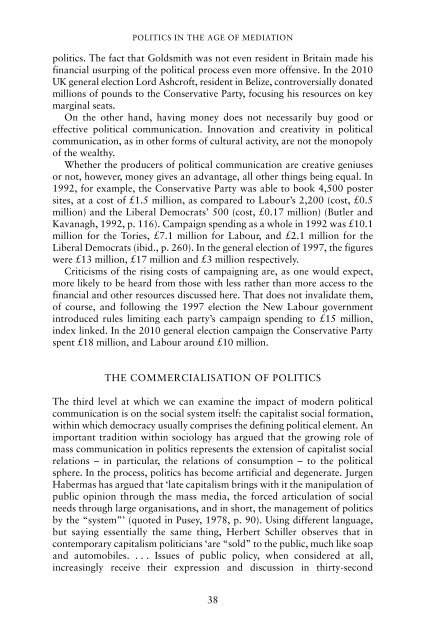20130412164339753295_book_an-introduction-to-political-communication
20130412164339753295_book_an-introduction-to-political-communication
20130412164339753295_book_an-introduction-to-political-communication
Create successful ePaper yourself
Turn your PDF publications into a flip-book with our unique Google optimized e-Paper software.
POLITICS IN THE AGE OF MEDIATION<br />
politics. The fact that Goldsmith was not even resident in Britain made his<br />
fin<strong>an</strong>cial usurping of the <strong>political</strong> process even more offensive. In the 2010<br />
UK general election Lord Ashcroft, resident in Belize, controversially donated<br />
millions of pounds <strong>to</strong> the Conservative Party, focusing his resources on key<br />
marginal seats.<br />
On the other h<strong>an</strong>d, having money does not necessarily buy good or<br />
effective <strong>political</strong> <strong>communication</strong>. Innovation <strong>an</strong>d creativity in <strong>political</strong><br />
<strong>communication</strong>, as in other forms of cultural activity, are not the monopoly<br />
of the wealthy.<br />
Whether the producers of <strong>political</strong> <strong>communication</strong> are creative geniuses<br />
or not, however, money gives <strong>an</strong> adv<strong>an</strong>tage, all other things being equal. In<br />
1992, for example, the Conservative Party was able <strong>to</strong> <strong>book</strong> 4,500 poster<br />
sites, at a cost of £1.5 million, as compared <strong>to</strong> Labour’s 2,200 (cost, £0.5<br />
million) <strong>an</strong>d the Liberal Democrats’ 500 (cost, £0.17 million) (Butler <strong>an</strong>d<br />
Kav<strong>an</strong>agh, 1992, p. 116). Campaign spending as a whole in 1992 was £10.1<br />
million for the Tories, £7.1 million for Labour, <strong>an</strong>d £2.1 million for the<br />
Liberal Democrats (ibid., p. 260). In the general election of 1997, the figures<br />
were £13 million, £17 million <strong>an</strong>d £3 million respectively.<br />
Criticisms of the rising costs of campaigning are, as one would expect,<br />
more likely <strong>to</strong> be heard from those with less rather th<strong>an</strong> more access <strong>to</strong> the<br />
fin<strong>an</strong>cial <strong>an</strong>d other resources discussed here. That does not invalidate them,<br />
of course, <strong>an</strong>d following the 1997 election the New Labour government<br />
introduced rules limiting each party’s campaign spending <strong>to</strong> £15 million,<br />
index linked. In the 2010 general election campaign the Conservative Party<br />
spent £18 million, <strong>an</strong>d Labour around £10 million.<br />
THE COMMERCIALISATION OF POLITICS<br />
The third level at which we c<strong>an</strong> examine the impact of modern <strong>political</strong><br />
<strong>communication</strong> is on the social system itself: the capitalist social formation,<br />
within which democracy usually comprises the defining <strong>political</strong> element. An<br />
import<strong>an</strong>t tradition within sociology has argued that the growing role of<br />
mass <strong>communication</strong> in politics represents the extension of capitalist social<br />
relations – in particular, the relations of consumption – <strong>to</strong> the <strong>political</strong><br />
sphere. In the process, politics has become artificial <strong>an</strong>d degenerate. Jurgen<br />
Habermas has argued that ‘late capitalism brings with it the m<strong>an</strong>ipulation of<br />
public opinion through the mass media, the forced articulation of social<br />
needs through large org<strong>an</strong>isations, <strong>an</strong>d in short, the m<strong>an</strong>agement of politics<br />
by the “system”’ (quoted in Pusey, 1978, p. 90). Using different l<strong>an</strong>guage,<br />
but saying essentially the same thing, Herbert Schiller observes that in<br />
contemporary capitalism politici<strong>an</strong>s ‘are “sold” <strong>to</strong> the public, much like soap<br />
<strong>an</strong>d au<strong>to</strong>mobiles. . . . Issues of public policy, when considered at all,<br />
increasingly receive their expression <strong>an</strong>d discussion in thirty-second<br />
38
















